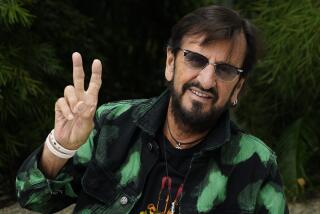Aides Seeking to Drop Some Events to Let Mandela Rest
- Share via
As Nelson Mandela heads for Boston this morning after a three-day whirlwind tour of New York, his worried advisers are increasingly eyeing events to drop from his schedule for the remaining seven cities in order to give him more rest.
“But clearly it cannot be events like this,” said one Mandela aide, Zwelahke Sisulu, as he looked out exuberantly from the speakers’ podium at Yankee Stadium Thursday night, gesturing expansively toward the thunderous crowd of 50,000.
Roger Wilkins, the tour’s national coordinator, agreed. “Mr. Mandela is an indispensable human being to the peace process. But he’s an elderly man, and he’s too precious to use up. We’re probably going to have to thin it out as we go,” he said.
Among the more likely events to be axed are small, private meetings with groups such as South African exiles and African National Congress members now living in the United States.
Two such meetings were abruptly canceled Wednesday night.
Because Mandela is not a head of state, security for his visit is entrusted to the State Department rather than the Secret Service.
And throughout his 12-day, eight-city journey, a State Department video crew has been tagging along to film his every public movement.
“We’ve never handled anything this big before,” said Jo Harben, a State Department security officer. “We can really learn from this.” Normally, she said, “We do people like Princess Di.”
Coretta Scott King was invited to New York by Ted Koppel to sit among the “distinguished guests” in the background during his nationally televised “town meeting.” But she begged off.
“Mrs. King didn’t want to be window dressing,” a King aide confided.
The widow of Dr. Martin Luther King Jr. will get her own moment in the limelight with Mandela on Wednesday in Atlanta. There, Mandela is scheduled to lay a wreath at the grave of the slain civil rights leader.
Although he is almost 72, Mandela is a powerful symbol and inspiration for inner-city youth, who see his struggle as a source of hope in their daily battle against drug dealers and criminals. If he could prevail against all odds, they reason, so might they.
Security around Mandela is tight, but Linda Taylor, a 20-year-old from the Bronx, said she hoped to get close enough to persuade him to sign a portrait she had of him.
“I want to get that picture blown up and put it into a special frame where nobody can touch it,” Taylor said. But it is not for herself. She wants to save it as a treasure she can someday hand to her son, who is not yet 2 years old.
A whirlwind tour allows few moments for reflection. However, one member of the small Mandela delegation paused late one night to step back and ponder the larger picture of rapid change in South Africa.
Zwelahke Sisulu, the son of African National Congress leader Walter Sisulu, is a Mandela adviser and newspaper editor who, many predict, will have an important role in the new South Africa. But he finds himself bewildered at times when he considers where that future may lead.
“Unlike Nelson and my father, most of us grew up knowing nothing but apartheid,” the racial segregation system imposed in the 1940s, Sisulu said. “It’s all we’ve ever known.”
After decades of oppression come the profound questions, he said with some bewilderment. “Who are we and where are we going?”
Mandela memorabilia was clearly the hottest selling merchandise a souvenir vendor could stock this week, but many were also doing a brisk traffic in items featuring that notorious preteen underachiever, Bart Simpson.
In the spirit of breaking down racial barriers, some also offered shirts featuring a black Bart. As Bart would say: Aye, caramba. Don’t have a cow, man.
More to Read
Sign up for Essential California
The most important California stories and recommendations in your inbox every morning.
You may occasionally receive promotional content from the Los Angeles Times.













